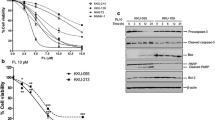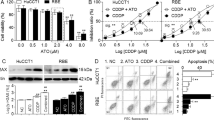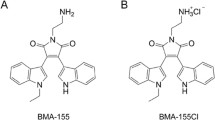Abstract
Cholangiocarcinoma (CCA) is a lethal malignancy of the cholangiocytes lining the biliary tree. Only 25% of affected patients are eligible for resection due to late-stage diagnosis. Systemic chemotherapy is recommended for those inoperable patients; however, an inadequate response to such treatment remains a significant obstacle. Piperlongumine (PL) is a biologically active alkaloid that selectively kills various cancer cells through the induction of reactive oxygen species (ROS). The role of PL has been shown through its inhibiting the ubiquitin–proteasome system. The mechanism of PL-induced CCA cell death was investigated by inhibiting the UPS and testing the therapeutic potential of combining PL and the proteasome inhibitor bortezomib. A single treatment with PL or BTZ suppressed CCA cell growth. Combined treatment with PL with BTZ produced a synergistic interaction, evidenced by (1) a combination index of < 1 and (2) induction of cell cycle arrest and down-regulation of cell cycle markers. PL induced the accumulation of poly-ubiquitinated proteins in CCA cells but did not affect proteasome activity. PL, in combination with BTZ, amplified the accumulation of poly-ubiquitinated proteins in CCA cells, leading to an endoplasmic reticulum (ER) stress response through the induction of X-box binding protein mRNA splicing. Moreover, PL-combined BTZ promoted the activation of a proapoptotic unfolded protein response via the ATF4-CHOP axis. PL induced CCA cell death via increased accumulation of the poly-ubiquitinated proteins. PL also enhanced the anti-cancer activity of BTZ via ER stress–induced CCA cell death. Thus, the combination of PL and BTZ has potential as an alternative therapeutic option for CCA.






Similar content being viewed by others
Data availability
All data generated or analyzed during the present study are included in this published article.
References
Abou-Alfa GK, Macarulla T, Javle MM, Kelley RK, Lubner SJ, Adeva J, Cleary JM, Catenacci DV, Borad MJ, Bridgewater J, Harris WP, Murphy AG, Oh DY, Whisenant J, Lowery MA, Goyal L, Shroff RT, El-Khoueiry AB, Fan B, Wu B, Chamberlain CX, Jiang L, Gliser C, Pandya SS, Valle JW, Zhu AX (2020) Ivosidenib in IDH1-mutant, chemotherapy-refractory cholangiocarcinoma (ClarIDHy): a multicentre, randomised, double-blind, placebo-controlled, phase 3 study. Lancet Oncol 6:796–807. https://doi.org/10.1016/S1470-2045(20)30157-1
Ao N, Dai Y, Chen Q, Feng Y, Yu J, Wang C, Liu F, Li M, Liu G (2019) Genome-wide profiling of the toxic effect of bortezomib on human esophageal carcinoma epithelial cells. Technol Cancer Res Treat. 18:1533033819842546. https://doi.org/10.1177/1533033819842546
Banales JM, Cardinale V, Carpino G, Marzioni M, Andersen JB, Invernizzi P, Lind GE, Folseraas T, Forbes SJ, Fouassier L, Geier A, Calvisi DF, Mertens JC, Trauner M, Benedetti A, Maroni L, Vaquero J, Macias RI, Raggi C, Perugorria MJ, Gaudio E, Boberg KM, Marin JJ, Alvaro D (2016) Expert consensus document Cholangiocarcinoma current knowledge and future perspectives consensus statement from the European Network for the Study of Cholangiocarcinoma (ENS-CCA). Nat Rev Gastroenterol Hepatol 13(5):261–80. https://doi.org/10.1038/nrgastro.2016.51
Banales JM, Marin JJG, Lamarca A, Rodrigues PM, Khan SA, Roberts LR, Cardinale V, Carpino G, Andersen JB, Braconi C, Calvisi DF, Perugorria MJ, Fabris L, Boulter L, Macias RIR, Gaudio E, Alvaro D, Gradilone SA, Strazzabosco M, Marzioni M, Coulouarn C, Fouassier L, Raggi C, Invernizzi P, Mertens JC, Moncsek A, Rizvi S, Heimbach J, Koerkamp BG, Bruix J, Forner A, Bridgewater J, Valle JW, Gores GJ (2020) Cholangiocarcinoma 2020: the next horizon in mechanisms and management. Nat Rev Gastroenterol Hepatol. 9:557–588. https://doi.org/10.1038/s41575-020-0310-z
Bhudhisawasdi V, Talabnin C, Pugkhem A, Khuntikeo N, Seow OT, Chur-in S, Pairojkul C, Wongkham S (2013) Evaluation of postoperative adjuvant chemotherapy for intrahepatic cholangiocarcinoma patients undergoing R1 and R2 resections. Asian Pac J Cancer Prev 13:169–174
Calvaruso G, Giuliano M, Portanova P, De Blasio A, Vento R, Tesoriere G (2006) Bortezomib induces in HepG2 cells IkappaBalpha degradation mediated by caspase-8. Mol Cell Biochem. 287(1–2):13–9. https://doi.org/10.1007/s11010-005-9016-3
Chatterjee A, Dutta CP (1967) Alkaloids of Piper longum Linn I Structure and synthesis of piperlongumine and piperlonguminine. Tetrahedron 23(4):1769–81. https://doi.org/10.1016/s0040-4020(01)82575-8
Chun-fung S, Wan TM, Mohan AMA, Qiu Y (2021) Jiao A (2021) Bortezomib is effective in treating T-ALL, inducing G2/M cell cycle arrest and WEE1 downregulation. Blood 138(1):4360
Crawford LJ, Walker B, Irvine AE (2011) Proteasome inhibitors in cancer therapy. J Cell Commun Signal. 2:101–110. https://doi.org/10.1007/s12079-011-0121-7
Deshaies RJ (2014) Proteotoxic crisis, the ubiquitin-proteasome system and cancer therapy. BMC Biol. 12:94. https://doi.org/10.1186/s12915-014-0094-0
Fels DR, Ye J, Segan AT, Kridel SJ, Spiotto M, Olson M, Koong AC, Koumenis C (2008) Preferential cytotoxicity of bortezomib toward hypoxic tumor cells via overactivation of endoplasmic reticulum stress pathways. Cancer Res 68(22):9323–9330. https://doi.org/10.1158/0008-5472.CAN-08-2873
Halasi M, Wang M, Chavan TS, Gaponenko V, Hay N, Gartel AL (2013) ROS inhibitor N-acetyl-L-cysteine antagonizes the activity of proteasome inhibitors. Biochem J 454(2):201–8. https://doi.org/10.1042/BJ20130282
Hideshima T, Mitsiades C, Akiyama M, Hayashi T, Chauhan D, Richardson P, Schlossman R, Podar K, Munshi NC, Mitsiades N, Anderson KC (2002) Molecular mechanisms mediating antimyeloma activity of proteasome inhibitor PS-341. Blood 101(4):1530–1534. https://doi.org/10.1182/blood-2002-08-2543
Jarvius M, Fryknäs M, D’Arcy P, Sun C, Rickardson L, Gullbo J, Haglund C, Nygren P, Linder S, Larsson R (2013) Piperlongumine induces inhibition of the ubiquitin-proteasome system in cancer cells. Biochem Biophys Res Commun 431(2):117–23. https://doi.org/10.1016/j.bbrc.2013.01.017
Javle M, Lowery M, Shroff RT, Weiss KH, Springfeld C, Borad MJ, Ramanathan RK, Goyal L, Sadeghi S, Macarulla T, El-Khoueiry A, Kelley RK, Borbath I, Choo SP, Oh DY, Philip PA, Chen LT, Reungwetwattana T, Van Cutsem E, Yeh KH, Ciombor K, Finn RS, Patel A, Sen S, Porter D, Isaacs R, Zhu AX, Abou-Alfa GK, Bekaii-Saab T (2018) Phase II study of BGJ398 in patients with FGFR-altered advanced cholangiocarcinoma. J Clin Oncol 36(3):276–282. https://doi.org/10.1200/JCO.2017.75.5009
Livak KJ, Schmittgen TD (2001) Analysis of relative gene expression data using real-time quantitative PCR and the 2(-delta delta C(T)) method. Methods. 25(4):402–8. https://doi.org/10.1006/meth.2001.1262
Marciniak SJ, Yun CY, Oyadomari S, Novoa I, Zhang Y, Jungreis R, Nagata K, Harding HP, Ron D (2004) CHOP induces death by promoting protein synthesis and oxidation in the stressed endoplasmic reticulum. Genes Dev 18(24):3066–3077. https://doi.org/10.1101/gad.1250704
Marin JJG, Lozano E, Briz O, Al-Abdulla R, Serrano MA, Macias RIR (2017) Molecular bases of chemoresistance in cholangiocarcinoma. Curr Drug Targets. 18(8):889–900. https://doi.org/10.2174/1389450116666150223121508
Nakata W, Hayakawa Y, Nakagawa H, Sakamoto K, Kinoshita H, Takahashi R, Hirata Y, Maeda S, Koike K (2011) Anti-tumor activity of the proteasome inhibitor bortezomib in gastric cancer. Int J Oncol 39(6):1529–1536. https://doi.org/10.3892/ijo.2011.1141
Nawrocki ST, Bruns CJ, Harbison MT, Bold RJ, Gotsch BS, Abbruzzese JL, Elliott P, Adams J, McConkey DJ (2002) Effects of the proteasome inhibitor PS-341 on apoptosis and angiogenesis in orthotopic human pancreatic tumor xenografts. Mol Cancer Ther. 1(14):1243–53. https://doi.org/10.3892/ol.2017.5585
Selvaraju K, Mofers A, Pellegrini P, Salomonsson J, Ahlner A, Morad V, Hillert EK, Espinosa B, Arnér ESJ, Jensen L, Malmström J, Turkina MV, D’Arcy P, Walters MA, Sunnerhagen M, Linder S (2019) Cytotoxic unsaturated electrophilic compounds commonly target the ubiquitin proteasome system. Sci Rep 9(1):9841. https://doi.org/10.1038/s41598-019-46168-x
Shen M, Schmitt S, Buac D, Dou QP (2013) Targeting the ubiquitin-proteasome system for cancer therapy. Expert Opin Ther Targets. 17(9):1091–1108. https://doi.org/10.1517/14728222.2013.815728
Sripa B, Seubwai W, Vaeteewoottacharn K, Sawanyawisuth K, Silsirivanit A, Kaewkong W, Muisuk K, Dana P, Phoomak C, Lert-Itthiporn W, Luvira V, Pairojkul C, Teh BT, Wongkham S, Okada S, Chamgramol Y (2020) Functional and genetic characterization of three cell lines derived from a single tumor of an Opisthorchis viverrini-associated cholangiocarcinoma patient. Hum Cell. 33(3):695–708. https://doi.org/10.1007/s13577-020-00334-w
Thongsom S, Suginta W, Lee KJ, Choe H, Talabnin C (2016) Piperlongumine induces G2/M phase arrest and apoptosis in cholangiocarcinoma cells through the ROS-JNK-ERK signaling pathway. Apoptosis. 11:1473–1484. https://doi.org/10.1007/s10495-017-1422-y (PMID: 28913568)
Uphoff CC, Denkmann SA, Drexler HG (2012) Treatment of mycoplasma contamination in cell cultures with Plasmocin. J Biomed Biotechnolhttps://doi.org/10.1155/2012/267678
Vaeteewoottacharn K, Kariya R, Matsuda K, Taura M, Wongkham C, Wongkham S, Okada S (2013) Perturbation of proteasome function by bortezomib leading to ER stress-induced apoptotic cell death in cholangiocarcinoma. J Cancer Res Clin Oncol 139(9):1551–62. https://doi.org/10.1007/s00432-013-1473-6
Valle J, Wasan H, Palmer DH, Cunningham D, Anthoney A, Maraveyas A, Madhusudan S, Iveson T, Hughes S, Pereira SP, Roughton M, Bridgewater J (2010) ABC-02 Trial Investigators Cisplatin plus gemcitabine versus gemcitabine for biliary tract cancer. N Engl J Med 362(14):1273–81. https://doi.org/10.1056/NEJMoa0908721
Weathington NM, Mallampalli RK (2014) Emerging therapies targeting the ubiquitin proteasome system in cancer. J Clin Invest 124(1):6–12. https://doi.org/10.1172/JCI71602
**ong XX, Liu JM, Qiu XY, Pan F, Yu SB, Chen XQ (2015) Piperlongumine induces apoptotic and autophagic death of the primary myeloid leukemia cells from patients via activation of ROS-p38/JNK pathways. Acta Pharmacol Sin 36(3):362–374. https://doi.org/10.1038/aps.2014.141
Xu L, Su L, Liu X (2012) PKCdelta regulates death receptor 5 expression induced by PS-341 through ATF4-ATF3/CHOP axis in human lung cancer cells. Mol Cancer Ther 11(10):2174–2182. https://doi.org/10.1158/1535-7163.MCT-12-0602
Yao Y, Sun Y, Shi M, **a D, Zhao K, Zeng L, Yao R, Zhang Y, Li Z, Niu M, Xu K (2016) Piperlongumine induces apoptosis and reduces bortezomib resistance by inhibiting STAT3 in multiple myeloma cells. Oncotarget. 7(45):73497–73508. https://doi.org/10.18632/oncotarget.11988
Zhang D, Fan R, Lei L, Lei L, Wang Y, Lv N, Chen P, Williamson RA, Wang B, Hu J (2020) Cell cycle exit during bortezomib-induced osteogenic differentiation of mesenchymal stem cells was mediated by Xbp1s-upregulated p21Cip1 and p27Kip1. J Cell Mol Med 24(16):9428–9438. https://doi.org/10.1111/jcmm.15605
Zheng J, Son DJ, Gu SM, Woo JR, Ham YW, Lee HP, Kim WJ, Jung JK, Hong JT (2016) Piperlongumine inhibits lung tumor growth via inhibition of nuclear factor kappa B signaling pathway. Sci Rep 6:26357. https://doi.org/10.1038/srep26357
Acknowledgements
We thank Mr. Bryan Roderick Hamman for assistance with the English-language presentation of the manuscript.
Funding
This work was supported by the Young Research Grants, Thailand Research Fund (TRG5680041) for C. Talabnin and the Development and Promotion of Science and Technology Talents Project (DPST) for funding and scholarship to Narathip Naradun.
Author information
Authors and Affiliations
Contributions
CT was the grant holder. CT conceived and designed the present study. NN and CT performed the experiments. CT, NN, and KT analyzed the data. KT and KIA provided guardian advice and resources. NN drafted the manuscript. CT revised the manuscript. All authors read and approved the published version of the manuscript.
Corresponding author
Ethics declarations
Ethics approval
Not applicable.
Consent for publication
Not applicable.
Competing interests
The authors declare no competing interests.
Additional information
Publisher's note
Springer Nature remains neutral with regard to jurisdictional claims in published maps and institutional affiliations.
About this article
Cite this article
Naradun, N., Talabnin, K., Ayuttha, K.I.n. et al. Piperlongumine and bortezomib synergically inhibit cholangiocarcinoma via ER stress–induced cell death. Naunyn-Schmiedeberg's Arch Pharmacol 396, 109–120 (2023). https://doi.org/10.1007/s00210-022-02305-4
Received:
Accepted:
Published:
Issue Date:
DOI: https://doi.org/10.1007/s00210-022-02305-4




